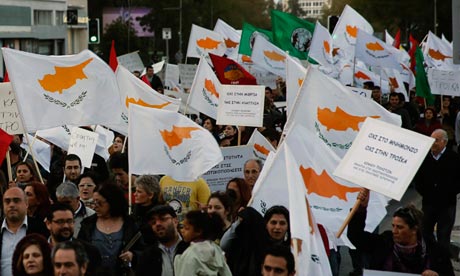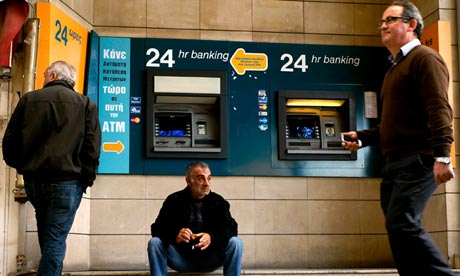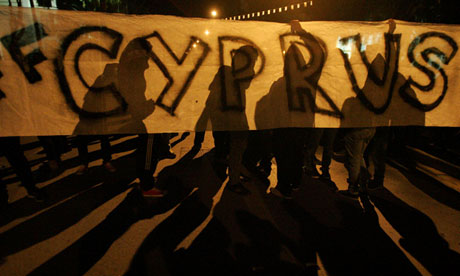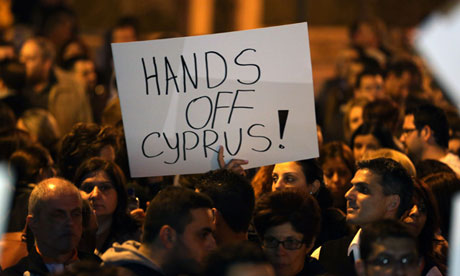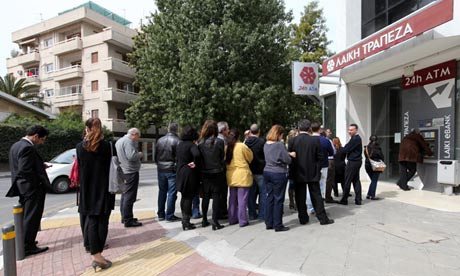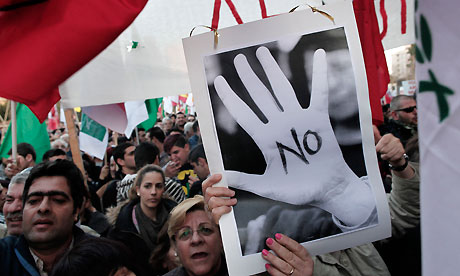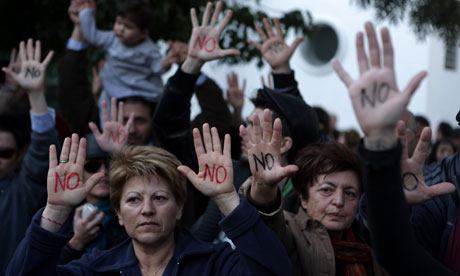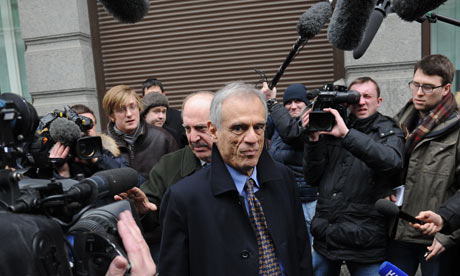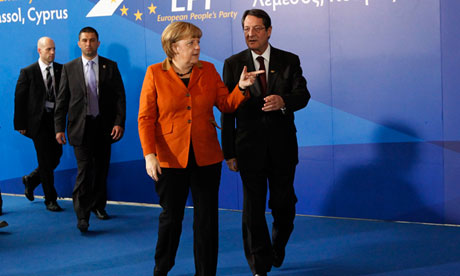By Nick Squires, in Nicosia 4:50PM GMT 28 Mar 2013
Cypriots formed orderly queues outside the country’s banks after they reopened for the first time in nearly two weeks on Thursday, confounding fears that there would be scenes of unrest and violence.

Although people waited patiently outside banks across the Mediterranean island, feelings of anger and frustration were just below the surface. Photo: Getty Images
Analysts said it was little surprise that there was no run on the banks in light of the draconian capital control restrictions that the Cypriot government hurriedly imposed late on Wednesday night.
It decreed that cash withdrawals would be limited to €300 per person a day and ruled that no cheques can be cashed.
Overseas credit payments were limited to €5,000 and Cypriots travelling abroad can take only €1,000 with them.
Cypriots did not besiege the banks to try to withdraw their life savings because they knew that the capital controls prevented it.
Although people waited patiently outside banks across the Mediterranean island, feelings of anger and frustration were just below the surface.
There are deep fears that the country of 850,000 people is about to plunge into a deep recession, as people who have lost their savings drastically cut back on spending, the financial sector shrinks and businesses shed thousands of jobs.
The two worst hit lenders are Laiki Bank, which is to be dissolved, and Bank of Cyprus, which will have to absorb Laiki’s assets.
Laiki depositors face losses of up to 80 per cent on accounts above €100,000, while Bank of Cyprus savers have been warned they may lose 40 per cent of their savings above the €100,000 mark.
The closure of the banks for 10 days has caused huge problems for Cypriot businesses, which have been unable to make payments.
“I have to make a deposit so that I can make payments to my creditors,” said Petros Stylianides, 46, who owns an insurance broker company, as he lined up outside a branch of the Bank of Cyprus in the capital, Nicosia.
“I hope the bank will be safe. But then we thought everything was safe. It never crossed our minds that something like this would happen. People are cutting salaries, they are laying off a third of their staff. We are going to get into a downward spiral.”
Police were put on standby and 180 private security guards from G4S, the British company which was last year involved in a security debacle at the Olympics, were posted inside the banks but they were hardly necessary.
Many people were furious with the harsh terms of a €10bn bail-out agreed in Brussels earlier this week and felt that it had been driven by Germany’s determination to impose its brand of fiscal austerity on the fragile economies of southern Europe.
Angela Merkel, the German Chancellor, was the target of particular resentment.
“Merkel says every single Cypriot is guilty of dirty banking. But it is the Germans who should be ashamed for the greatest evil in the history of Europe – the Holocaust,” said a furious Cleri Machlouzarides, a chartered architect, outside a branch of Laiki Bank.
“Tell the bloody Nazis to go home. Germany should go and find someone their own size to pick on instead of trying to strangle us. Europeans should know it’s not going to stop here. “Luxembourg is next, then Spain, Portugal, Ireland.”
A 34-year-old businessman who runs a telecommunications company said he had been unable to pay his creditors for two weeks and had begged them to be patient.
“My fear is that they will drop me and take on a different partner company. I built the business up over six or seven years but it now it could be destroyed and I would have to start again from scratch,” said Miltos, who declined to give his surname.
The introduction of the capital control rules was unprecedented in the 14-year history of the euro.
The European Commission said the controls were legal and justified under EU law as long as they were temporary and proportionate.
They are supposed to be in place for just a week, but many analysts were sceptical.
In a Reuters poll of economists this week 30 out of 46 said the controls would last months, while 13 expected they would endure a matter of weeks. Three said they could last years. "This is a typical set of exchange control measures, more reminiscent of Latin America or Africa," said Bob Lyddon, the general secretary of the international banking association IBOS. "These are permanent controls until the economy recovers."
In a statement, the president of Cyprus, Nicos Anastasiades, thanked people for their patience, expressing his “warm gratitude and deep appreciation towards the Cypriot people for the maturity and spirit of responsibility they have shown at a critical time for the stability of the Cypriot economy.”
In a gesture of solidarity, the president announced that he had cut his salary by a quarter, while his cabinet ministers reduced their stipends by 20pc.
![The [Greek] European Tragedy](https://blogger.googleusercontent.com/img/b/R29vZ2xl/AVvXsEiWKI5s90SFm1wWTk6bs4p7CgslaC2SnYPsrZhb-B-smOufNNCSxCvpBLI9hOB-LsXZjir_PNmEiMk2-E62F3xkg96IoC6QFAaZAnPRTVH340IN9WBRmWJqPkjWlgyRj3zpALp7h6hvA58/s920/GkBack_new.jpg)

